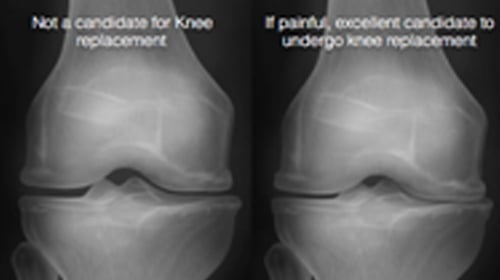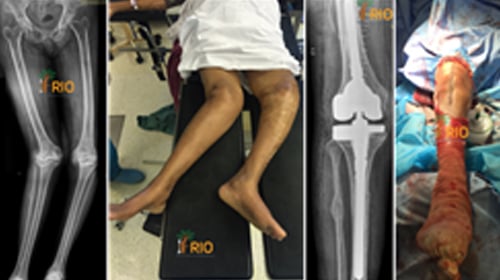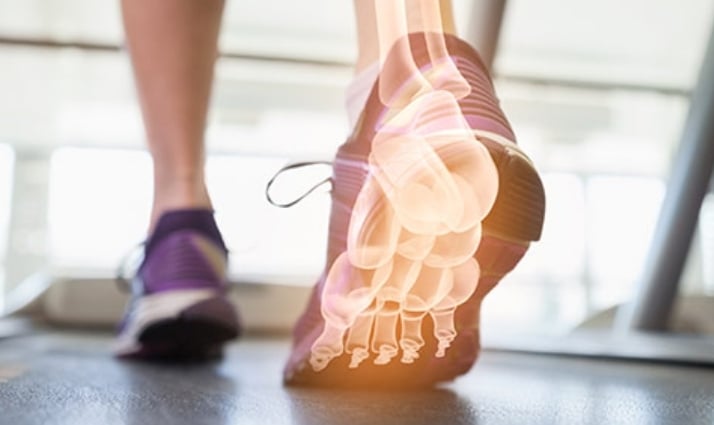Advanced Knee Arthritis
September 1, 2019

I have advanced knee arthritis. My doctor advised me knee replacement surgery. Do I require one?
This is a lingering question in the minds of a lot of elderly people with prolonged knee pain after consulting a lot of orthopedic surgeons. This article will provide some insight for patients before contemplating knee replacement surgery.
Total knee replacement has emerged as a highly successful surgery for management of endstage knee arthritis. 15 – 20% of patients undergoing knee replacement surgery continue to suffer and feel dis-satisfied with their surgery. Reasons are many, including poor technique on part of the surgeon, but the most important factor for poor outcome is improper patient selection in 80% of the cases.
So what are the risk factors for dis-satisfaction after a knee replacement?
- Wrong diagnosis: Various conditions may mimic arthritic pain from the knee and it is the responsibility of the surgeon to exclude these before attributing the knee as the source of pain. Disorders of the spine and hip can co-exist and if identified as a possible source of pain, may require treatment before addressing the knee.Ruling out other sources is an important part of the preoperative evaluation to avoid dis-satisfaction after knee replacement surgery.
- Lack of symptoms: ‘No Pain – No Surgery’. Patients with no or minimal pain without need for medications tend to have inferior results with knee replacement irrespective of what is seen on their x-ray. Knee replacement is mainly performed to address pain due to arthritis and lack of pain pre-operatively will mean that patient will not benefit much after surgery.
- Operating too early:
 Knee replacement is indicated when you have a painful ‘BONE ON BONE’ arthritis which means the entire cartilage in the knee is worn out. Doing a knee replacement in early stages of arthritis is often a cause for poor patient satisfaction. There are other non surgical and surgical options to treat early arthritis. Knee replacement is extremely successful to treat pain due to advanced arthritis but the results are poor if done in early stages.
Knee replacement is indicated when you have a painful ‘BONE ON BONE’ arthritis which means the entire cartilage in the knee is worn out. Doing a knee replacement in early stages of arthritis is often a cause for poor patient satisfaction. There are other non surgical and surgical options to treat early arthritis. Knee replacement is extremely successful to treat pain due to advanced arthritis but the results are poor if done in early stages. - Extremes of age:
 Though no arbitrary age cut off could be defined, knee replacement is preferred in an elderly patient with end stage arthritis. Knee replacement in a very active young patient is performed rarely in severe rheumatoid arthritis, after trauma or infections where patients may do much better with a knee replacement than going through severe pain and disability during their productiveage. Similarly the satisfaction rates can be low in extremelyold and frail patients with limited mobility and cognitive impairment. We don’t define age limits and the decision is purely made based on the functional demands of the patient, degree of pain and disability. After all age is just a number.
Though no arbitrary age cut off could be defined, knee replacement is preferred in an elderly patient with end stage arthritis. Knee replacement in a very active young patient is performed rarely in severe rheumatoid arthritis, after trauma or infections where patients may do much better with a knee replacement than going through severe pain and disability during their productiveage. Similarly the satisfaction rates can be low in extremelyold and frail patients with limited mobility and cognitive impairment. We don’t define age limits and the decision is purely made based on the functional demands of the patient, degree of pain and disability. After all age is just a number. - Unrealistic expectations: A patient undergoing a knee replacement needs extensive counseling and education regarding the outcome of procedure in a personalized manner. The dos and don’ts, what to expect after surgery, time taken for recovery, degree of pain relief, amount of movement possible at the knee and any patient specific demands should be thoroughly addressed. A good surgery by the surgeon and an expensive implant alone doesn’t always guarantee a good outcome. A lot of patient specific factors like age, weight, activity level and other medical conditions can have a significant say in the outcome and needs to be discussed with the patient to keep expectations realistic.
So who is an ideal patient to undergo knee replacement?
I consider an active person after their 50s suffering from intractable knee pain, which is significantly hindering their daily routine making them either avoid their personal and social commitments, or force them to take regular medications to overcome pain, with x-rays showing advanced cartilage degeneration to be an ideal candidate for knee replacement. Special considerations are given to young patients with rheumatoid, psoriatic and severe post-traumatic or post-infective arthritis who may also benefit from knee replacement surgery with better mobility, pain relief and a superior quality of life.
How do we go about it at Rela Institute of Orthopedics?

We break down the procedure into 3 parts. i) Pre – operative evaluation – is the key for a good outcome. We follow unique state of the art protocols for evaluating and preparing a smooth road map for surgery keeping patients well informed and counselled by a dedicated team of counselors.Elaborate assessment is performed using subjective/objective methods to make sure the patient indeed requires a knee replacement & will benefit from one. ii) Surgical procedure – is performed using state of the art techniques by highly qualified felowship trained surgeons to deliver predictable results. The team uses spacesuits, ultra-sterile operating rooms, computer navigation systems and customised instruments (3D printed jigs) to achieve optimal outcomes. iii) Pain – management after knee replacement is a crucial element in the overall success of the procedure. In our practice, pain management starts much before the surgery using preemptive analgesia (to control pain before surgery to smoothen the transition to surgery). Postoperative pain is well taken care off using multimodal pain management protocols to tackle pain, enable faster recovery and expedite rehabilitation.
WHY Rela Hospital
Department of Orthopaedics, offers round the clock state- of-the- art accessible and affordable specialty orthopaedic and emergency trauma care services. The scope of services will include, premium outpatient care focusing on preventive and therapeutic orthopaedics, sports rehabilitation & physiotherapy services, hassle-free day-care surgeries, complex orthopaedic and spine surgeries and luxury inpatient services to the neighbourhood and people from all over the globe. This will be complemented by a ‘NO WAIT’ 24/7 trauma service, designed on the lines of a level I trauma centre (standards set by the American Trauma Society, ATS) and a fully equipped ultra – modern sports rehabilitation facility to expedite injury and post-surgery recovery.









